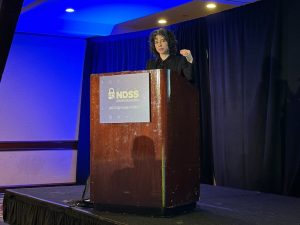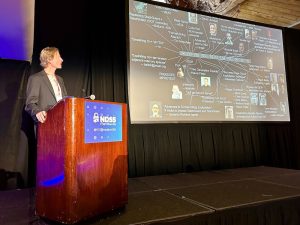Last year, the NDSS Symposium celebrated its 30th anniversary–quite an achievement for a conference that aims to stay at the leading edge of research into distributed systems security.
In 2024, we may not have passed a similar milestone, but we certainly had a lot to celebrate. For one thing, 2024 marked a return to an entirely in-person event. Our worries about whether this might cause a number drop-off proved unfounded: 633 registrants surpassed the 2023 figure for in-person and remote attendance combined! We also had a record-breaking number of submissions (694) and accepted papers (140), making for a full three-day, three-track symposium.
Running an event on this scale requires support, and we owe huge thanks to our sponsors:
- Patron Sponsor: Ant Group
- Gold Sponsors: Google and TikTok
- Silver Sponsors: FutureWei and IBM
- Lanyard sponsor: Qualcomm
- NDSS-VehicleSec Reception sponsors: CSU and the CyberTruck Challenge
- Student Support Grant sponsors: the Office of Naval Research and the National Science Foundation
- Co-located event sponsors: Arizona State University, Denso, ETAS, General Motors, the National Motor Freight Traffic Association (NMFTA), Zoox, and ST Microelectronics.
We couldn’t do it without you!
Keynotes Offer Timely Reminders

We had two superb and memorable keynotes. The first, from Meredith Whittaker (President of Signal), could not have been timelier. Looking back to the “Crypto Wars” of the 90s, she gave a clear and informed perspective on the political, technical, and commercial pressures that have shaped our current encryption policy landscape.
Her analysis led to a stark warning: we’re mistaken if we assume we are in the midst of ‘Crypto Wars 2.0’… because an economic engine fuelled by personal data, surveillance technology, and AI/ML represents a very different threat to the 90s domination of encryption technology by government expertise and regulation. Fundamentally, different forces are now at work and require a different response: NDSS research is at the leading edge of that response.

Our second keynote was also a retrospective but a far more personal one, as Professor Herbert Bos charted his own journey through the security culture (and, let’s face it, sub-culture) of the first few decades of the Internet. It was a thoughtful reminder that ‘security research’ takes many forms, and academia doesn’t have a monopoly on either the expertise or the relevance of that research. Although academics, commercial security specialists, and hackers may have very different motives and reward structures, we ignore the findings of their work at our peril.
We will update the website in the coming weeks with slides from all the presentations. You can view video recordings of all sessions via the NDSS YouTube channel.
The Research Papers and Awards
Once more, we offer our paper and poster award winners sincere congratulations. It’s not easy getting a paper accepted for the NDSS Symposium (with an acceptance rate for 2024 of just over 20%), so winning an award is a significant achievement.
Distinguished Paper Award
Like, Comment, Get Scammed: Characterizing Comment Scams on Media Platforms
Xigao Li (Stony Brook University), Amir Rahmati (Stony Brook University), Nick Nikiforakis (Stony Brook University)
UntrustIDE: Exploiting Weaknesses in VS Code Extensions
Elizabeth Lin (North Carolina State University), Igibek Koishybayev (North Carolina State University), Trevor Dunlap (North Carolina State University), William Enck (North Carolina State University), Alexandros Kapravelos (North Carolina State University)
Eavesdropping on Controller Acoustic Emanation for Keystroke Inference Attack in Virtual Reality
Shiqing Luo (George Mason University), Anh Nguyen (George Mason University), Hafsa Farooq (Georgia State University), Kun Sun (George Mason University), Zhisheng Yan (George Mason University)
LMSanitator: Defending Prompt-Tuning Against Task-Agnostic Backdoors
Chengkun Wei (Zhejiang University), Wenlong Meng (Zhejiang University), Zhikun Zhang (CISPA Helmholtz Center for Information Security and Stanford University), Min Chen (CISPA Helmholtz Center for Information Security), Minghu Zhao (Zhejiang University), Wenjing Fang (Ant Group), Lei Wang (Ant Group), Zihui Zhang (Zhejiang University), Wenzhi Chen (Zhejiang University)
Distinguished Artifact Award
NDSS Symposium 2024 broke new ground by introducing a Distinguished Artifact Award. This award is in recognition of the extra work done by some authors to explain and package their research tools, not just the methodology and the findings. This additional effort removes obstacles to reproducing the research elsewhere and further demonstrates the open access principle at the heart of NDSS Symposium. Here are the two “inaugural” winners of this award:
Efficient and Timely Revocation of V2X Credentials
Gianluca Scopelliti (Ericsson & KU Leuven), Christoph Baumann (Ericsson), Fritz Alder (KU Leuven), Eddy Truyen (KU Leuven), Jan Tobias Mühlberg (Université libre de Bruxelles & KU Leuven)
5G-Spector: An O-RAN Compliant Layer-3 Cellular Attack Detection Service
Haohuang Wen (The Ohio State University), Phillip Porras (SRI International), Vinod Yegneswaran (SRI International), Ashish Gehani (SRI International), Zhiqiang Lin (The Ohio State University)
Best Technical Poster
On the Cyber-Physical Security of Commercial Indoor Delivery Robot Systems
Fayzah Alshammari, Yunpeng Luo, and Qi Alfred Chen (Univesity of California, Irvine)
Best Poster Presentation
MORPH: Towards Automated Concept Drift Adaptation for Malware Detection
Md Tanvirul Alam (Rochester Institute of Technology), Romy Fieblinger (Rochester Institute of Technology, University of Applied Sciences), Ashim Mahara (Rochester Institute of Technology), Nidhi Rastogi (Rochester Institute of Technology)
Test of Time Award
SMART: Secure and Minimal Architecture for (Establishing Dynamic) Root of Trust (Presented at NDSS Symposium 2012)
Karim El Defrawy, Aurélien Francillon, Daniele Perito, Gene Tsudik
People Make NDSS Symposium What It Is
NDSS is unique in so many ways.
The first is fundamental: the “open access” principle under which NDSS publishes all the papers, presentations, and session videos accepted for the program. This is critical to the Internet Society as a part of our mission to build, promote, and defend the Internet as a global force for good. The more secure and resilient we can make the network of networks and the systems and services that connect to it, the greater the Internet’s potential to benefit humankind.
The second is the exciting set of co-located events on topics as diverse as running a security operations center, securing connected objects in space, and, something close to my heart, making privacy protections both practical and usable.
The third is the willingness of so many people to volunteer, in addition to their busy day jobs, to ensure that NDSS Symposium happens, thrives, and succeeds. As I noted above, in 2023—24, we had almost 700 submissions: we could not have distilled those to such a high-quality program without the volunteer work from nearly 120 reviewers and two exceptional Program Committee co-chairs, Mathias Payer and Christina Pöpper.
Of course, one other thing that has made the NDSS Symposium special over the years is its San Diego venue. It was with some sadness that this year, we said a grateful farewell to the Catamaran Resort, which has hosted NDSS Symposium for many years in a unique and relaxing ambiance. However, as victims of our own success, we have outgrown the Catamaran’s capacity and, next year, will relocate a short distance to a larger venue on the San Diego downtown waterfront.
We hope to see you at NDSS Symposium 2025, whether it’s as an award-winner, an attendee, an author, a session chair, or on one of the organizing committees. Your participation helps the NDSS Symposium grow and thrive, which is essential for the security and trustworthiness of an open, globally connected Internet.
Image credit: © Joe Hall